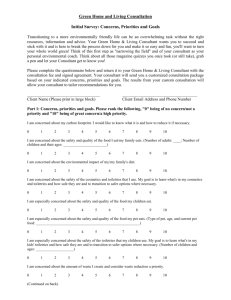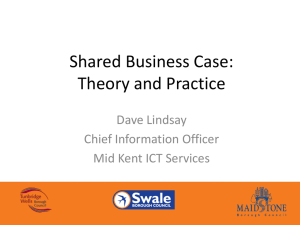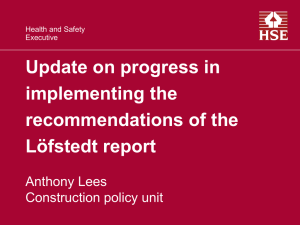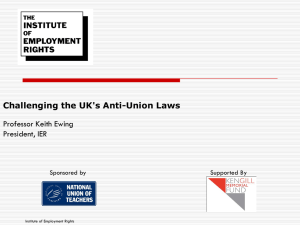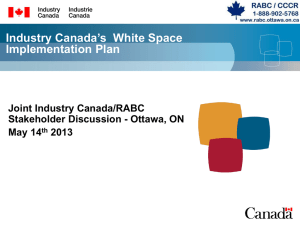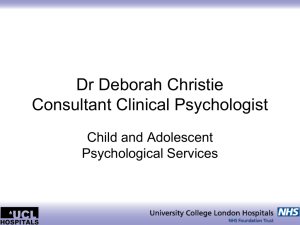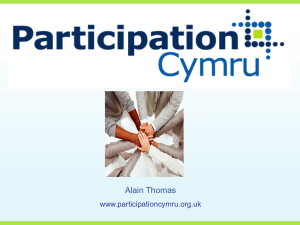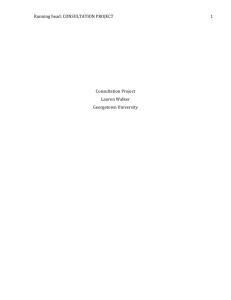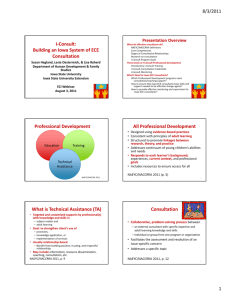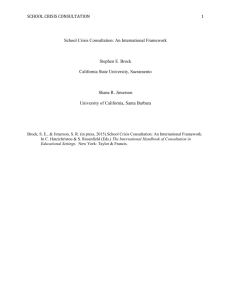Improving Communication in the Emergency Department: The 5 Cs
advertisement
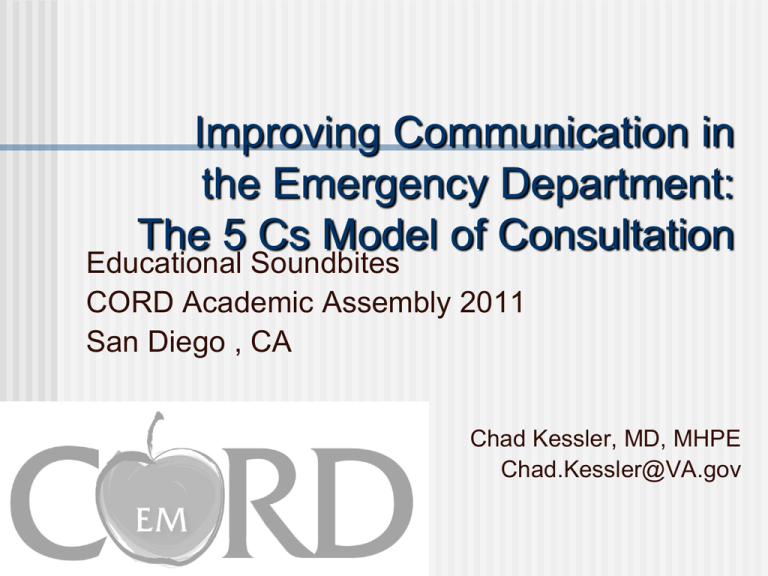
Improving Communication in the Emergency Department: The 5 Cs Model of Consultation Educational Soundbites CORD Academic Assembly 2011 San Diego , CA Chad Kessler, MD, MHPE Chad.Kessler@VA.gov 15 Minute Plan of Attack Identification of a problem Communication and consultation background What’s the big idea? The 5 Cs of Consultation Impact to the field Questions and comments Identification of a Problem Lack of formal training in undergraduate or graduate medical education Background: Clinical Communication for safe patient care Medical errors Delays in treatment and care Hand-offs and consultations Lack of standardized process or model JCAHO. Sentinel Event Alert. Delays in treatment. http://www.jointcommission.org/assets/1/18/SEA_26.pdf. 2002; 26. Accessed Oct 1, 2010. Cheung DS, Kelly JJ, Beach C, et al. Improving handoffs in the emergency department. Ann Emerg Med. 2010 Feb; 55(2):171-80. Beach C, Croskerry P, Shapiro M. Profiles in Patient Safety: Emergency Care Transitions. Acad Emerg Med. 2003; 10(4):364-367. Education: ACGME Core Competencies Patient Care Medical Knowledge Practice-Based Learning and Improvement Interpersonal and Communication Skills Professionalism Systems-Based Practice ACGME: Outcome Project, General Competencies. http://www.acgme.org/outcome/comp/compmin.asp. Accessed Sep 15, 2010. What’s the Big Idea? Qualitative analysis of consultation Monster literature search Kessler C, Kutka B, Badillo C. Consultation in the Emergency Department: A Qualitative Analysis and Review of the Consultative Process. In Press. The Journal of Emergency Medicine. Data from Study: Skills for successful Consultation Number of Theme Sub-themes Comments Classic Example Organizational Skills 1) Focused questions and 41 (43%) “…knowing specifically what you answers want from a consultant as well as 2) Concise and coherent anticipating what they will need to presentations give their assessment, speaking 3) Promptness briefly and getting to the point 4) Adequate preparation quickly.” Interpersonal and 1) Politeness Communication Skills 2) Willingness to help 26 (27%) “…prompt, pleasant and treated us as equals.” 3) Clear communication Medical Knowledge 1) Accurate history 2) Investigating the problem 3) Ownership of patient 28 (30%) Taking “ownership of the patient.” 5 Cs Checklist Assessment Five C’s Contact Introduction of consulting and consultant physicians. Building of relationship. Checklist Item - States name - States rank and service - Identifies supervising attending - Identifies name of consultant physician Done _____ _____ _____ _____ Not Done _____ _____ _____ _____ Communicate - Presents a concise story Give a concise story and ask focused - Presents an accurate recount of questions. information/case detail - Speaks clearly _____ _____ _____ _____ _____ _____ Core Question - Specifies need for consultation Have a specific question or request - Specifies timeframe for consultation of the consultant. Decide on reasonable timeframe for consultation. _____ _____ _____ _____ Collaboration - Is open to and incorporates consultant’s A result of the discussion between recommendations the ED physician and the consultant, including any alteration of management or testing _____ _____ Closing the Loop - Reviews and repeats patient care plan Ensure that both parties are on the - Thanks consultant for consultation same page regarding the plan and maintain proper communication about any changes in the patient’s status. _____ _____ _____ _____ Reliability Inter-item reliability of GRS (Chronbach’s alpha) Rater 1 Rater 2 Rater 3 0.9 0.89 0.87 Inter-rater reliability for GRS 0.71 Inter-rater reliability for checklist 0.94 Correlation (pearson) between GRS and checklist (n=43, p<0.0001) Surgery cases Psychiatry cases r=0.59 r=0.71 Main Results Intervention group had significantly higher GRS scores (4.1 vs. 3.5, F(1,39)=33.5, p<0.0001) and Checklist Scores (10.7 vs. 7.0, F(1,39)=196, p<0.0001). No natural progression in consulting skills with increasing PGY level Impact to the Field An effective, standardized model of consultation; the 5 Cs Assessment of difficult to measure/quantify ACGME core competencies Wide-spread education for undergraduate and graduate medical learners Stepping it Up From simulated setting to clinical setting Demonstrate improvement in process measures and patient outcomes Improve communication and relationships Improve patient safety Decrease resource utilization Electronic Medical Records Beyond Emergency Medicine Sug/quest/ments

